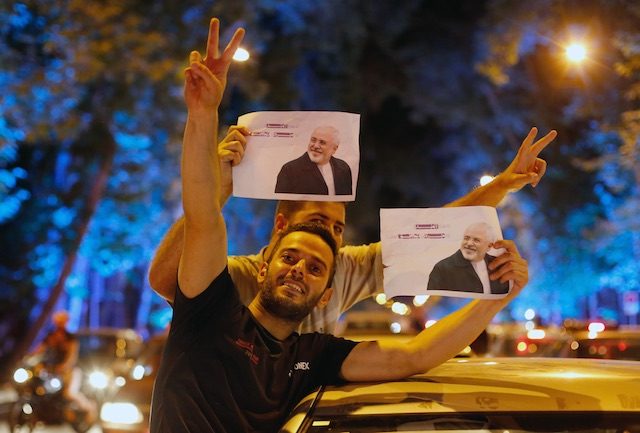SUMMARY
This is AI generated summarization, which may have errors. For context, always refer to the full article.

TEHRAN, Iran – The crowd was small at first but as the din of car horns grew louder so did the number of Iranians celebrating a long-awaited nuclear deal in Tehran late Tuesday, July 14.
Some said they hoped it would improve their lives and change Iran’s image abroad. Others simply wanted to express their gratitude.
“Thank you Mr Zarif,” said Parvaneh Farvadi, among the hundreds who assembled at Parkway, a busy intersection in the north of the capital, shortly after sundown.
Her admiration was not confined to Iran’s Foreign Minister Mohammad Javad Zarif, whose name rang out in song.
“I love John Kerry,” the 32-year-old said of the US Secretary of State who for almost two years has faced Zarif at the forefront of nuclear talks which culminated in Tuesday’s historic deal.
“We are so happy. The diplomacy worked,” Farvadi added, as people placed Iranian flags atop their car windscreens and others held balloons out of the windows. Some people even danced.
Several drivers also carried a large wooden key – the symbol of President Hassan Rouhani’s successful election campaign two years ago, after which a nuclear deal became his dominant aim.
As a candidate Rouhani said the key stood for “prudence and hope”, and pledged the nuclear crisis could be solved and economic prosperity restored after nearly a decade of international sanctions.
At Parkway, most people evoked the same wish of better times, recounting a turbulent period, including recession and high inflation in which the nuclear dispute defined Iran’s image abroad.
‘Because we’re happy’
“If you look at the street tonight it’s because we’re happy,” said Giti, 42, who returned to Iran three years ago having lived in Canada and the United States and was again considering a move abroad.
The nuclear deal may change her mind.
“Maybe the economy is going to change, especially for the young people. I was thinking about leaving, but now I will stay to see what happens,” said the computer programmer.
“I could never have imagined this, even two years ago,” she added.
While some in the crowd chanted “Iran, Iran, Iran!” several groups of young students hailed Zarif in the same breath as Mohammad Mossadegh, the democratically elected premier overthrown in a US-British coup in 1953.
“Mossadegh, Zarif, Mossadegh, Zarif, these are the heroes of Iran,” they sang with flags draped across their shoulders as the road started to clog up with cars and people dodged the traffic.
Mossadegh, who was toppled after nationalizing the nation’s oil industry, is regarded as one of Iran’s greatest sons.
Other celebrations took place across the capital, official media said, with pictures and video of the revelry posted on social media.
“Condolences Israel and Kayhan,” people chanted at Vanak Square, referring to the biggest international opponent of a nuclear deal and a hardline Iranian newspaper that also railed against the diplomacy of the past two years.
Relief and enthusiasm
Authorities appeared apprehensive earlier this week about people celebrating the same way they did after a preliminary deal was agreed with world powers on April 2.
Warnings from some officials may have been heeded as while there were several celebrations the numbers looked to be in the hundreds rather than the thousands, observers said.
In the first hour at Parkway there was no police presence, but social media posts later said officers had arrived to exercise some control.
When news of the deal first came through around noon in Tehran, where the temperature hit 39ºC (102ºF), there was relief and enthusiasm.
“It’s great news because the economy will boom,” said accountant Behnam Arian at Argentine Square, a busy commercial district in the capital.
Hamid Bahri, an engineer, was happy the talks were finally over after 18 days of waiting for a breakthrough in Vienna.
“Any deal is better than no deal,” he said.
Such optimism was not universal.
“This deal will have no effect on the economic development and daily lives of Iranians,” said Abtin Afarinsh, who sells luxury leather goods.
Shrugging his shoulders, he added: “I’m not going to be fooled by this.” – Arthur Macmillan, AFP / Rappler.com
Add a comment
How does this make you feel?
There are no comments yet. Add your comment to start the conversation.